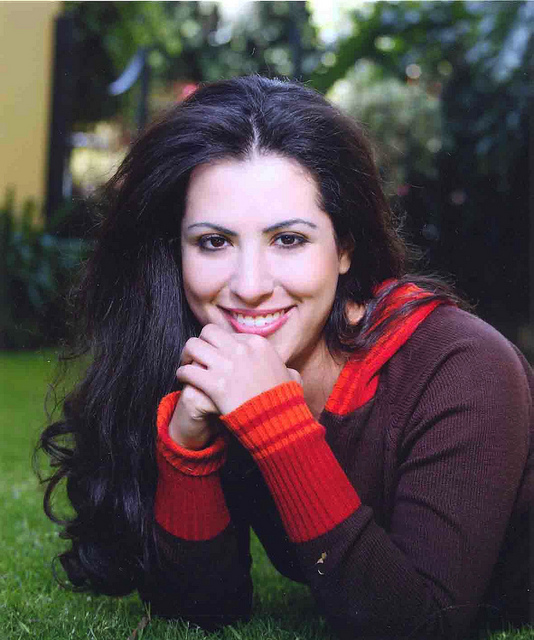
Soprano readies for FGO, looks to future
Last month, I sat down with the Mexican soprano Maria Alejandres for a discussion about her appearance with Palm Beach Opera in the title role in Donizetti’s Lucia di Lammermoor.
As it happens, the day after the Palm Beach run of Lucia ended, she traveled to Miami to start rehearsals for Florida Grand Opera’s upcoming season closer, Charles Gounod’s Romeo et Juliette, the French composer’s 1867 take on the Shakespeare story.
Because I knew she was going to be singing Juliette for Florida Grand Opera, I thought I’d ask her about that show, too, while I had her attention.
Alejandres, 27, comes from a musical family in Mexico City. Both of her parents are violinists in the national orchestra there, and her sister is a pianist. She began her own musical life as a violinist before switching to voice, and lives in Milan these days, where she studies with Mexican tenor Ramon Vargas.
She won first prize in 2008 at the Operalia Competition, which was founded by Placido Domingo, and at the Francesco Viñas competition, she took the Carlo Bergonzi Prize, named for the great Italian tenor. She debuted as Juliette at the Royal Opera House in London’s Covent Garden, and in the same role, she made her debut at La Scala in Milan and the Opera de Lausanne in Switzerland.
Juliette, she said, is among her very favorite roles.
“I love it. Juliette for me was a very special role in my life, in my career, because it is one of the first roles I learned,” she said. “With this role, I won Operalia; with this role, I have sung in La Scala, Covent Garden … So it’s in my heart. I can feel it. I can really feel Juliette so well.”
Alejandres is making a return appearance with Florida Grand Opera, having sung with the company previously as Lucia in two performances in January 2011. She said she loves to work in the States and had high praise for the Palm Beach and Miami companies.
“It was great. I had a good time, they are great musicians. The orchestra, the theater, the company — I love it. They treated us very well,” she said.
She also makes a point of noting how “organized” American companies are compared to ones in Italy.
“In Italy, it’s not so organized. La Scala is organized, but the rest — it’s a little bit complicated sometimes,” Alejandres said. “Also in Mexico, it’s complicated. They are not organized … I started my career in Italy, and that’s why I can say they are not organized at all. It’s always difficult, they are always complaining. In every performance, they have to say: ‘We’re not making the performance today. It’s canceled.’ It’s always like this,” she said.
But there are compensations, not least of which is working in the country that gave birth to the art form.
“They have a great passion, a deep passion. And I like it. I love to work in Italy because they are such passionate people,” she said. “The opera is, for them, the most traditional art. It’s something very natural for them.”
Later this year, she’ll be singing Gilda in Verdi’s Rigoletto for La Scala’s tour of Japan, and also will tackle Massenet’s Manon and Donna Anna in Mozart’s Don Giovanni.
The days of standing and belting, which is anecdotally the way operatic performances were given for much of the last century, are long gone. Today’s singers have to have acting chops, too.
“You have to be a good actress. And it helps with the voice,” she said. “I prefer to be a good actress because it really supports my voice, and I’m not thinking all the time about the voice. The voice just comes. When you have the technique and you have the role well-learned, the voice comes.”
That way, she said, you can concentrate on what you’re doing on stage.
“It’s very important. It has to be real,” she said.
In the near future, Alejandres is looking forward to the more iconic lyric roles, particularly the heroines of Puccini.
“I feel very comfortable singing what I’m singing now: Gilda, Lucia, Juliette,” she said. “But my voice is more lyrical, so I will find my way in several years to sing ‘Boheme’ and ‘Traviata,’ and ‘Tosca.’”
And she will get there by being as ready as she can be to advance her career and take on new operatic challenges.
“You have to every time, always, be careful about your voice, to train it every day. The more prepared you are, it’s better. If you know more languages, it’s better,” she said.
***
Romeo et Juliette opens April 21 at the Ziff Ballet Opera House in Miami and concludes its run May 12 at the Broward Center for the Performing Arts in Fort Lauderdale. Call 800-741-1010 for tickets or visit www.fgo.org.
Recent Content
-
Artsarticle ·
-
Artsarticle ·
-
Artsarticle ·
